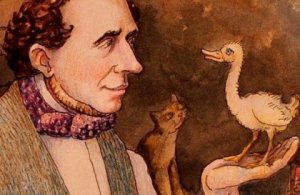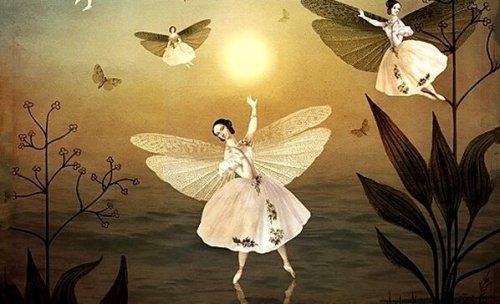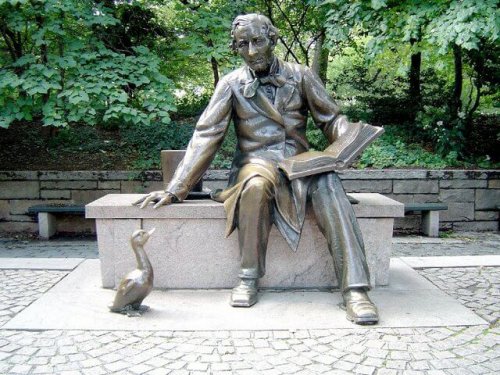The Most Memorable Hans Christian Andersen Quotes

Hans Christian Andersen quotes have survived several generations and spread around the world. Unlike other fairy tale authors, this wonderful Danish writer and poet stands out due to his human, realistic, and optimistic stories.
There’s something truly magical about this author’s life. When he was born, his family was so poor that they made him a crib out of an old casket’s wood. Furthermore, his death seems a fairy tale as well: he fell from his bed and didn’t survive his injuries.
Overall, he had a very unfortunate life. In his diary, he poured out his sadness and disappointments. Nevertheless, almost all of Hans Christian Andersen’s quotes are hopeful and invite the reader to keep on dreaming. Here are some of his most memorable quotes.
“But a mermaid has no tears, and therefore she suffers so much more.”
-Hans Christian Andersen-
Life and Small Troubles
Several Hans Christian Andersen quotes compare life to literature. One of his quotes reads: “Life itself is the most wonderful fairy tale”.
He didn’t consider fairies supernatural, but a part of wonderful daily events that people sometimes aren’t aware of.
Another one of his quotes was precisely about daily life: “But these are small troubles, people will say. Yes, but they are drops which wear hollows in the rock”. In this case, he focused on the fact that people should address and solve even the smallest problems because they can become very harmful with time.

Words and Music
The Ugly Duckling and The Little Mermaid’s writer loved music as well. In fact, his tale called The Steadfast Tin Soldier, among others, had been adapted to famous operas. One of his quotes that truly shows his passion for music reads: “Where words fail, music speaks”.
Here is another Hans Christian Andersen quote that mentions music: “The good and the beautiful is not forgotten; it lives in legend and in song”. This quote explains that art, particularly literature and music, helps approach the best and most beautiful things in life.
A Hans Christian Andersen Quote about Reasoning
It’s obvious that this Danish writer had an extremely fertile imagination. Although he wrote many adult books, he loved narrating children’s stories.
Thus, several Hans Christian Andersen quotes try to remind readers that imagination is important, even more so than rationality. Here’s a perfect example: “When the bird of the heart begins to sing, too often will reason stop up her ears”.
Everything’s a Miracle
Andersen had an unhappy childhood. His father died when he was only 11 years old, which forced him to quit school and start working. Although his mother was very kind, she was an alcoholic. Perhaps all of this encouraged him to become an avid reader, especially of Shakespeare’s work.
Despite everything he suffered, some of Hans Christian Andersen’s quotes are baffling due to how hopeful and optimistic they are. This is one of them: “The whole world is a series of miracles, but we’re so used to them we call them ordinary things”. Maybe his own unfortunate life prepared him to pay attention to the positive things around him.

The Only Way to Be Happy According to Hans Christian Andersen
Hans Christian Andersen was an artist. He loved writing, singing, and dancing. He also enjoyed traveling and valued how enriching it is to meet new places and cultures. Although Andersen was full of life, he never found love.
Even so, one of his quotes reads: “To be of use to the world is the only way to be happy”. He also said that he wanted to make a story out of his life; a story worth telling. Curiously enough, he achieved both things: he was useful and happy and transcended time.
Andersen received many awards throughout his life. He overcame poverty, traveled the world, and he dedicated his life to what he loved the most: writing. His art is simply one of a kind.
Hans Christian Andersen quotes have survived several generations and spread around the world. Unlike other fairy tale authors, this wonderful Danish writer and poet stands out due to his human, realistic, and optimistic stories.
There’s something truly magical about this author’s life. When he was born, his family was so poor that they made him a crib out of an old casket’s wood. Furthermore, his death seems a fairy tale as well: he fell from his bed and didn’t survive his injuries.
Overall, he had a very unfortunate life. In his diary, he poured out his sadness and disappointments. Nevertheless, almost all of Hans Christian Andersen’s quotes are hopeful and invite the reader to keep on dreaming. Here are some of his most memorable quotes.
“But a mermaid has no tears, and therefore she suffers so much more.”
-Hans Christian Andersen-
Life and Small Troubles
Several Hans Christian Andersen quotes compare life to literature. One of his quotes reads: “Life itself is the most wonderful fairy tale”.
He didn’t consider fairies supernatural, but a part of wonderful daily events that people sometimes aren’t aware of.
Another one of his quotes was precisely about daily life: “But these are small troubles, people will say. Yes, but they are drops which wear hollows in the rock”. In this case, he focused on the fact that people should address and solve even the smallest problems because they can become very harmful with time.

Words and Music
The Ugly Duckling and The Little Mermaid’s writer loved music as well. In fact, his tale called The Steadfast Tin Soldier, among others, had been adapted to famous operas. One of his quotes that truly shows his passion for music reads: “Where words fail, music speaks”.
Here is another Hans Christian Andersen quote that mentions music: “The good and the beautiful is not forgotten; it lives in legend and in song”. This quote explains that art, particularly literature and music, helps approach the best and most beautiful things in life.
A Hans Christian Andersen Quote about Reasoning
It’s obvious that this Danish writer had an extremely fertile imagination. Although he wrote many adult books, he loved narrating children’s stories.
Thus, several Hans Christian Andersen quotes try to remind readers that imagination is important, even more so than rationality. Here’s a perfect example: “When the bird of the heart begins to sing, too often will reason stop up her ears”.
Everything’s a Miracle
Andersen had an unhappy childhood. His father died when he was only 11 years old, which forced him to quit school and start working. Although his mother was very kind, she was an alcoholic. Perhaps all of this encouraged him to become an avid reader, especially of Shakespeare’s work.
Despite everything he suffered, some of Hans Christian Andersen’s quotes are baffling due to how hopeful and optimistic they are. This is one of them: “The whole world is a series of miracles, but we’re so used to them we call them ordinary things”. Maybe his own unfortunate life prepared him to pay attention to the positive things around him.

The Only Way to Be Happy According to Hans Christian Andersen
Hans Christian Andersen was an artist. He loved writing, singing, and dancing. He also enjoyed traveling and valued how enriching it is to meet new places and cultures. Although Andersen was full of life, he never found love.
Even so, one of his quotes reads: “To be of use to the world is the only way to be happy”. He also said that he wanted to make a story out of his life; a story worth telling. Curiously enough, he achieved both things: he was useful and happy and transcended time.
Andersen received many awards throughout his life. He overcame poverty, traveled the world, and he dedicated his life to what he loved the most: writing. His art is simply one of a kind.
All cited sources were thoroughly reviewed by our team to ensure their quality, reliability, currency, and validity. The bibliography of this article was considered reliable and of academic or scientific accuracy.
Andersen, H. C., Pedersen, V., & Frølich, L. (1991). Cuentos completos. Anaya.
This text is provided for informational purposes only and does not replace consultation with a professional. If in doubt, consult your specialist.







